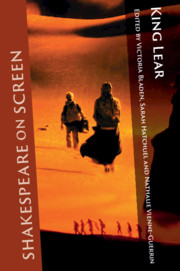Book contents
- Shakespeare on Screen: King Lear
- Series page
- Shakespeare on Screen: King Lear
- Copyright page
- Dedication
- Contents
- Illustrations
- Notes on Contributors
- Series Editors’ Preface
- Acknowledgements
- Chapter 1 Introduction: Dis-locating King Lear on Screen
- Part I Surviving Lear: Revisiting the Canon
- Part II Lear en Abyme: Metatheatre and the Screen
- Part III The Genres of Lear
- Part IV Lear on the Loose: Migrations and Appropriations of Lear
- Chapter 10 Relocating Jewish Culture in The Yiddish King Lear (1934)
- Chapter 11 The Trump Effect: Exceptionalism, Global Capitalism and the War on Women in Early Twenty-first-century Films of King Lear
- Chapter 12 Looking for Lear in The Eye of the Storm
- Chapter 13 Between Political Drama and Soap Opera: Appropriations of King Lear in US Television Series Boss and Empire
- Chapter 14 Afterword: Godard’s King Lear
- Chapter 15 King Lear on Screen: Select Film-bibliography
- Index
- References
Chapter 11 - The Trump Effect: Exceptionalism, Global Capitalism and the War on Women in Early Twenty-first-century Films of King Lear
from Part IV - Lear on the Loose: Migrations and Appropriations of Lear
Published online by Cambridge University Press: 10 September 2019
- Shakespeare on Screen: King Lear
- Series page
- Shakespeare on Screen: King Lear
- Copyright page
- Dedication
- Contents
- Illustrations
- Notes on Contributors
- Series Editors’ Preface
- Acknowledgements
- Chapter 1 Introduction: Dis-locating King Lear on Screen
- Part I Surviving Lear: Revisiting the Canon
- Part II Lear en Abyme: Metatheatre and the Screen
- Part III The Genres of Lear
- Part IV Lear on the Loose: Migrations and Appropriations of Lear
- Chapter 10 Relocating Jewish Culture in The Yiddish King Lear (1934)
- Chapter 11 The Trump Effect: Exceptionalism, Global Capitalism and the War on Women in Early Twenty-first-century Films of King Lear
- Chapter 12 Looking for Lear in The Eye of the Storm
- Chapter 13 Between Political Drama and Soap Opera: Appropriations of King Lear in US Television Series Boss and Empire
- Chapter 14 Afterword: Godard’s King Lear
- Chapter 15 King Lear on Screen: Select Film-bibliography
- Index
- References
Summary
This essay explores three turn-of-the-century spinoffs of King Lear: Kristian Levring’s The King is Alive (2000), Don Boyd’s My Kingdom (2001) and Eli Udell’s King of Texas (2002). In each of these films, King Lear becomes a vehicle for the ‘new racism of the developed world’ (Slavoj Žižek). This ideology has been taken to an extreme by US President Donald Trump, whose Muslim ban and plans for a wall separating the USA from Mexico are merely the latest variations on a xenophobic theme. The chapter argues that the roots of this crisis moment, magnified by ‘the immigrant flood’ of Syrian refugees converging upon Europe, are rooted in gender, as ongoing efforts to subjugate and micromanage the female body are becoming the very condition of the state of exception.What the chapter refers to proleptically as the ‘Trump effect’, namely, the definition of the female body as the subject of punishment, or in Agamben’s terms, as homo sacer – a life that can be killed but not sacrificed – emerges in each film’s interpolated scenes of gratuitous violence against women.
- Type
- Chapter
- Information
- Shakespeare on Screen: King Lear , pp. 171 - 184Publisher: Cambridge University PressPrint publication year: 2019



